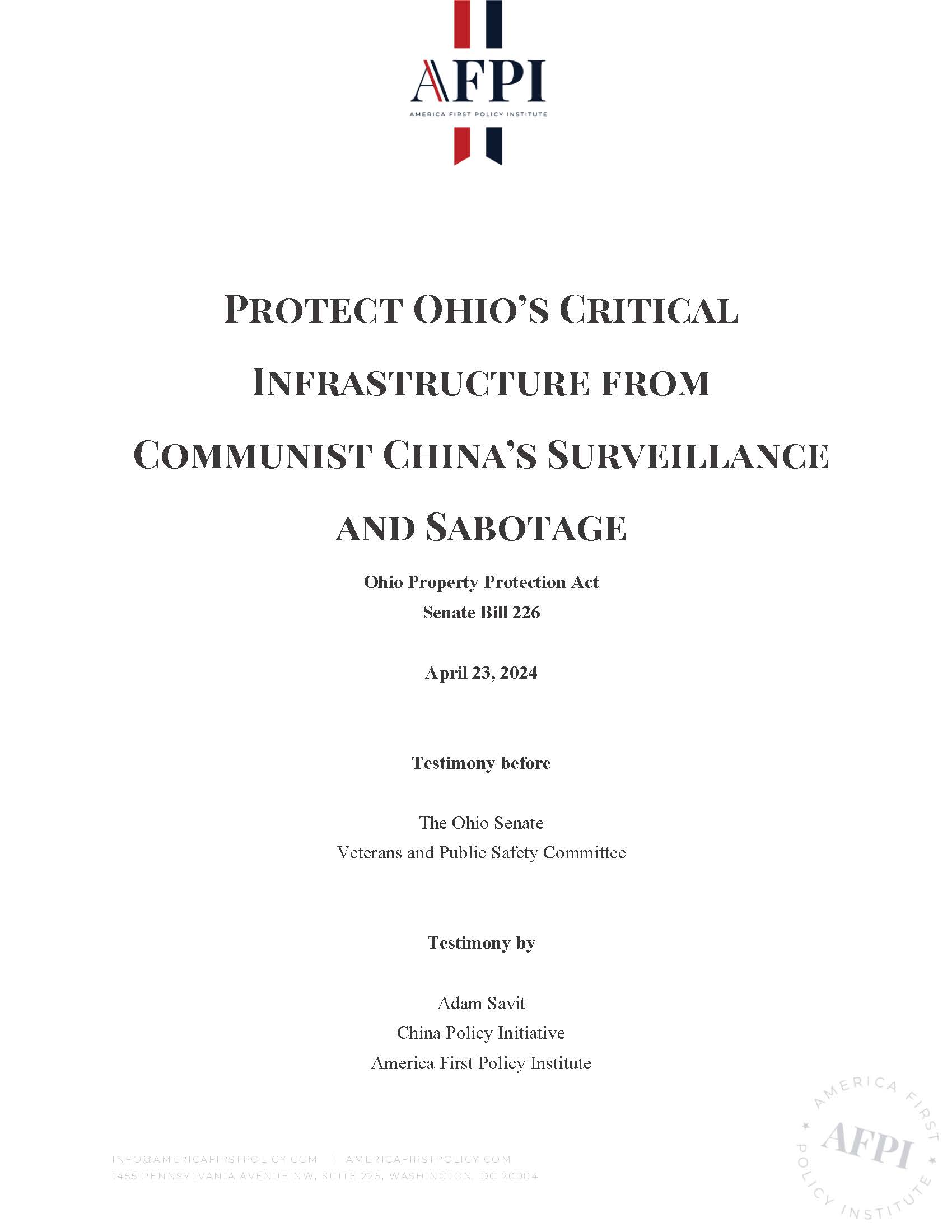Protect Ohio’s Critical Infrastructure from Communist China’s Surveillance and Sabotage
Good afternoon, Chair Johnson and Veterans and Public Safety Committee, and thank you very much for allowing me to testify today.
My name is Adam Savit, and I am the director of the China Policy Initiative at America First Policy Institute (AFPI).
At AFPI, we believe that the Chinese Communist Party (CCP) poses a comprehensive threat to U.S. national security. The path to American success lies in our own economic prosperity, secure supply chains, energy independence, and military deterrence to neutralize this threat while avoiding war. As a guiding principle, America First policy begins with reciprocity—the CCP and anyone tied to it should have no access to any institution or opportunity in America beyond that to which we have access in China. Chief among these is access to property.
These same values inspired state legislators to introduce a wave of bills in 2023 state sessions to prevent the CCP and other adversaries from acquiring agricultural land. Understandably so.
The CCP agricultural footprint in the United States is significant. The Department of Agriculture reports that Chinese investors’ holdings of U.S. agricultural land surged from 13,720 acres in 2010 to 352,140 acres in 2020—a stunning 5,300 percent increase.
The two most troubling cases involved the farming sector. In 2019, Chinese billionaire Sun Guangxin invested an estimated $110 million in Texas farmland near Laughlin Air Force Base, along some of its training flight paths. He planned to build a wind turbine farm on a 15,000-acre parcel that would also give him access to the Texas electricity grid. The Committee on Foreign Investment in the United States (CFIUS) signed off on the proposal in December 2020, but a combination of state and local action deterred the development of the wind farm.
In 2022, CCP food manufacturer FuFeng Group bought land near Grand Forks Air Force Base in North Dakota—a facility CFIUS failed to include in existing federal regulations as a designated military installation and a transaction over which the CFIUS claimed it had no jurisdiction. Media exposure and local pressure defeated the proposed development, but CFIUS’ unwillingness or inability to act exposed a major gap in land security.
The important connection between these two incidents was not necessarily that both involved the agricultural sector but the proximity of the land to sensitive national security sites and critical infrastructure. And so, as in many cases when federal safeguards fail in their duty to protect American citizens, it fell to the states, our 50 creative laboratories of democracy, to find a solution.
That is why SB 226, the Ohio Property Protection Act, is vital not only to maintain the security of Ohioans but also to serve as an example for dozens of states attempting to tackle this problem. It could eventually help to provide a solution for the entire Nation.
This bill precisely targets foreign adversary countries as determined in Ohio by the secretary of state, as well as citizens and businesses of those countries and their agents or trustees. This bill would not target American citizens of any background or their businesses.
This bill clearly designates “protected property” as agricultural land or real property located within 25 miles of installations under the jurisdiction of the armed forces or a critical infrastructure facility. “Critical infrastructure” includes power stations, chemical facilities, water treatment facilities, gas pipelines, ports, dams, and other sites comprehensively defined in Ohio code.
The 25-mile proximity provision is crucial to deny CCP agents the ability to sabotage or surveil these protected properties. Last month, Indiana signed a proximity ban around its military installations, blocking CCP’s FuFeng from a potential acquisition of land near a railroad junction. The governor of Missouri enacted an executive order with comparable provisions in January, and a similar bill passed the Kansas House this month.
In early 2023, a CCP spy balloon traversed the entire continental United States. It was a wake-up call for average Americans about the vulnerability of our airspace to Chinese surveillance penetration. If left open to CCP control, our real property provides nearly limitless bases for “permanent spy balloons” near our most vulnerable installations.
I strongly encourage you to support SB 226. We must provide effective protection for our communities before a serious and completely preventable incident takes place.
